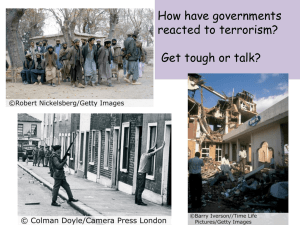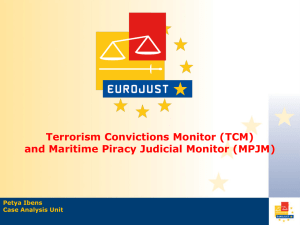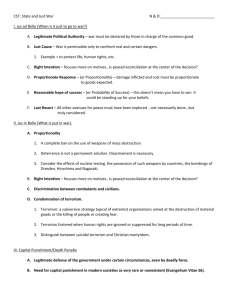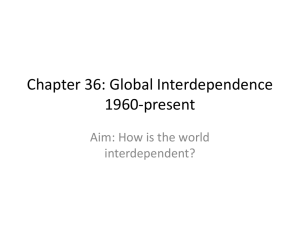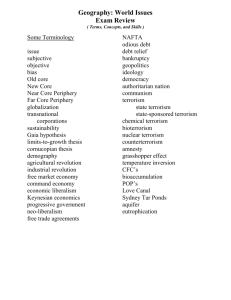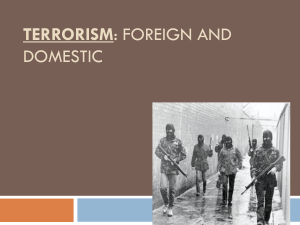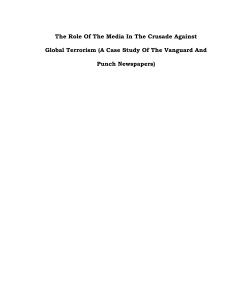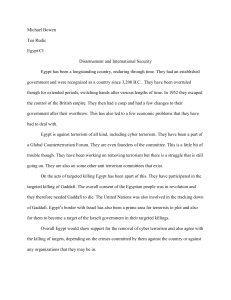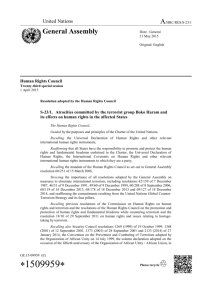English - Paper Smart
advertisement
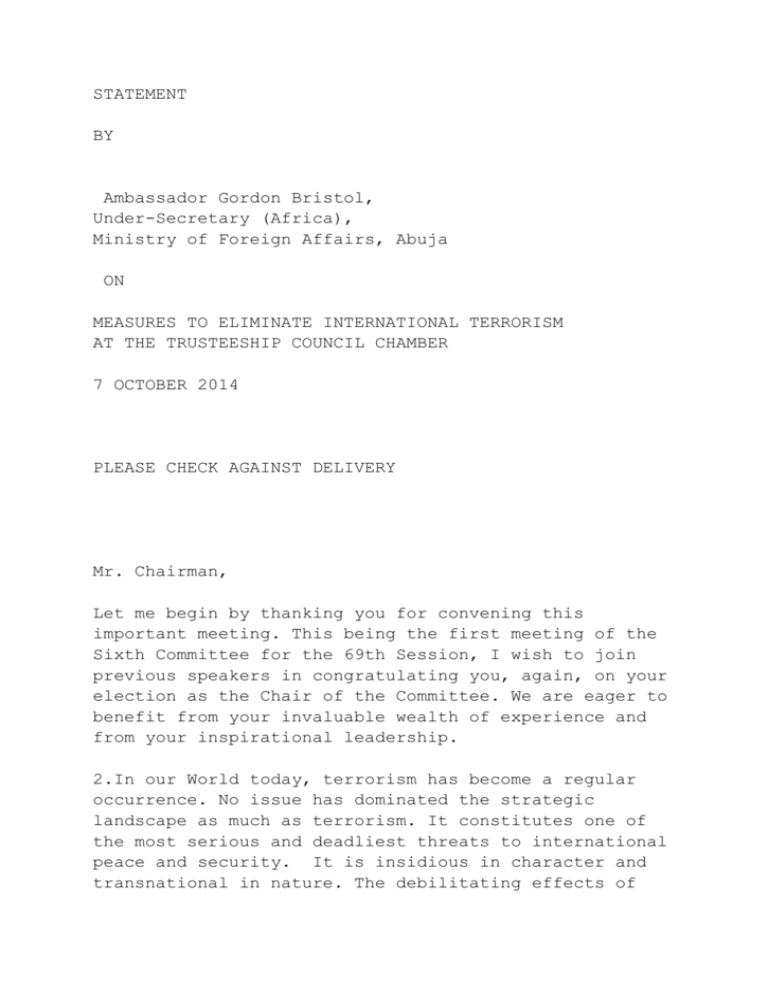
STATEMENT BY Ambassador Gordon Bristol, Under-Secretary (Africa), Ministry of Foreign Affairs, Abuja ON MEASURES TO ELIMINATE INTERNATIONAL TERRORISM AT THE TRUSTEESHIP COUNCIL CHAMBER 7 OCTOBER 2014 PLEASE CHECK AGAINST DELIVERY Mr. Chairman, Let me begin by thanking you for convening this important meeting. This being the first meeting of the Sixth Committee for the 69th Session, I wish to join previous speakers in congratulating you, again, on your election as the Chair of the Committee. We are eager to benefit from your invaluable wealth of experience and from your inspirational leadership. 2.In our World today, terrorism has become a regular occurrence. No issue has dominated the strategic landscape as much as terrorism. It constitutes one of the most serious and deadliest threats to international peace and security. It is insidious in character and transnational in nature. The debilitating effects of terrorist acts, including the erosion of law and order, the destabilization of structures of governance and its negative impact on economic growth have adversely affected development and stability in many countries. Mr. Chairman, 3. Recent terrorist attacks and onslaught across the World, particularly in Africa, serve to remind us that this threat is a clear and present danger. It constitutes a threat to the great and small; to the strong and weak alike. Terrorism is organized in a tightly woven network. We believe it will take a network to defeat a network. With this understanding comes the realisation of the importance of an allinclusive regional and international collaborative approach to deter and defeat terrorists. The key to its defeat is best described by a naval maxim, "all hands on Deck." 4.For this reason, my delegation supports the initiative of establishing a Working Group to finalize the process of drafting a Comprehensive Convention on International Terrorism as well as the convening of a High-Level Conference under the auspices of the United Nations. We note that the Working Group will be meeting on 24 October and 4 to 5 November, 2014. We are looking forward with keen interests to the outcomes of these meetings. Mr. Chairman, 5.My delegation commends the Secretary-General for his report before us on "Measures to Eliminate International Terrorism," which was submitted pursuant to General Assembly resolutions 50/53 and 68/119. We noted that the report also contains a summary of the replies received from states, relevant specialized agencies and other relevant international organizations on measures taken at the national, regional and international levels on the prevention and suppression of international terrorism. It also contains information on incidents caused by international terrorism as well as information on national laws and regulations on counter-terrorism. 6.In Nigeria, we have over the past months faced an upsurge of terrorists’ challenges in several parts of the country by a notorious terrorist group, which has come to be identified as Boko Haram. The group indiscriminately targets civilians, Muslims and Christians alike, all places of worship, recreational centers, and media establishments, not even a UN Building was spared in 2011. These acts, rather than daunt Nigeria, helped to strengthen our resolve to rise up against the scourge of terrorism through development of new national plans, closer cooperation with our neighbours and the international community. 7.In this regard, in March 2014, Nigeria rolled out a 4–part plan of action to address the terrorist cycle, from radicalization to rehabilitation. The strategy, which is premised on Nigeria’s national experiences as well as aspects of the UNSG report (S/2014/9) on the work of the UN to help States and sub-regional entities in Africa in fighting terrorism, involves all tiers of the Nigerian Government and consists of four streams. 8.The first stream is de-radicalization of convicted terrorists, suspects awaiting trial and those who might be released through court orders or such Government decision arising from the on-going engagement and dialogue with repentant suspects. The second stream is targeted at the whole society, which is expected to galvanize the Nigerian society against terrorism through the family, cultural, religious and national value systems. The third stream is aimed at building capacity to communicate national values coherently and institutionalize such capability through the military and law enforcement. The fourth stream, which took cognizance of the economic root causes of terrorism, involves the economic revitalization of six States in the Northeast of Nigeria. Mr. Chairman, 9.The Nigerian strategy, which is tagged the Soft Approach to Counter Violent Extremism, will be subject of a Policy Dialogue here at the United Nations ECOSOC Chamber on 13th October 2014 at 1300 hours, my delegation is inviting all members of this Committee to attend this event to enrich its outcome by sharing perspectives. 10.To firm up this national initiative and create a regional basis for it to succeed, Nigeria reached an understanding with her contiguous neighbours to share intelligence and ultimately set up an Intelligence Fusion Center in Abuja. Joint border patrols and joint trainings are other aspects of the envisaged cooperation. At the international level, Nigeria has added the entities Boko Haram and its splinter group, Ansaru, as well as the individual, Abubakar Mohammed Shekau, the leader of the Boko Haram to the United Nations 1267 Al-Qaida Sanctions list. Mr. Chairman, 11.Nigeria remains committed to working closely with CTITF and all UN counter-terrorism entities. We also note, with satisfaction, the role being played by the United Nations Centre for Counter Terrorism (UNCCT) in the fight against terrorism as well as the synergy evolving between the Centre and CTITF entities. Nigeria, like all Member States, wishes to extend her thanks and appreciation for the generous donation by His Royal Majesty, the King of Saudi Arabia to the UN counter- terrorism efforts. Mr. Chairman, 12.In the face of the accelerating global security challenges, Cyber threat has become co-terminus with violence of terrorism. Cyber threats, which can cause mass disruption of business communications; manufacture; service delivery and workings of Governments, is indeed, another peril to humanity. Every attack, regardless of its target, poses a global threat and could imperil commerce and communications among all nations, due to the interconnections of digital infrastructure and networks as well as the interdependencies of national and regional economies. We must do more by developing an analogous approach against this danger. 13.One thing is clear: The war against terrorism on all frontiers can only be achieved through firm and determined resolve by all Member States of the United Nations. To this end, for the global community to effectively tackle terrorism, Nigeria believes there is need for States Parties to ensure full compliance with all United Nations Resolutions and Conventions against terrorism and its financing as well as other instruments adopted at regional levels. Mr Chairman, 14.Finally, my delegation wishes to seize this opportunity to extend our gratitude to all Member States for their concern and support during Nigeria’s travails in the hands of the terrorists. 15.I thank you for your attention.

